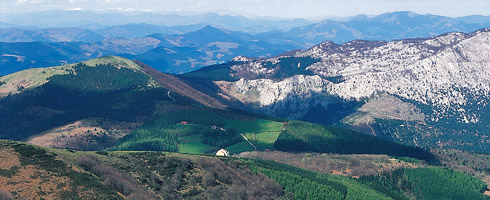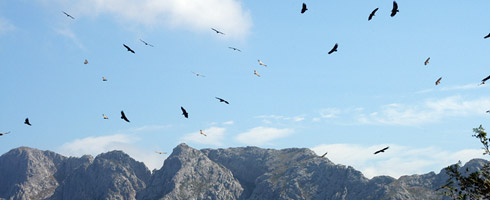Parque Natural de Urkiola · Ayuntamiento de Abadiño
Situación
Menú principal

The different habitats of the mountains of the Urkiola Natural Park are home to a rich and varied range of vertebrates, consisting of 137 species (4 fish, 7 amphibians, 10 reptiles, 74 birds and 42 mammals). The main habitats are the rocks, forests, thickets, grazing land and the wet zones, consisting of streams, springs and peat mosses. Each animal has its own ecological requirements and is looking for an optimum place where to live, and we can therefore refers to the fauna of the crags, of the forests, etc. Not all the species have the same level of tolerance to their surroundings and there are animals that are much more sensitive than others to changes to their natural environment. These changes can be due to natural processes, such as climatic change or a fire. However, others have been caused by man, such as the felling of the forests or the replacement of the native trees by conifer reforested areas. Each animal reacts in a different way to the changes to its habitat. There were some species in the past that were hunted to the point of extinction. That is the case of the bear, wolf and the lammergeier that lived in the Duranguesado mountains up to the end of the 19th century. However, other species have been able to adapt, such as the fox, wild boar and the Griffon vulture, whose populations have even increased since the area was declared a Park in 1989. Species that disappeared years ago have also returned and their numbers are now growing, which is the case of the roe deer.
Special mention should be made of the birds, as the park is home to a large number of species of birds of prey, which include the Egyptian vulture, the Peregrine falcon, the goshawk and sparrow hawk. In addition to the birds of preys, flocks of woodpigeons, thrushes and Passeriformes can be seen flying over the Urkiola slopes on their migratory routes. Among the mammals, special mention should be made of the presence of various carnivores, such as the pine marten, beech marten, civet cat, badger and the stoat.

2006 - 2007 © Anteiglesia de Abadiño Town Council - All rights reserved